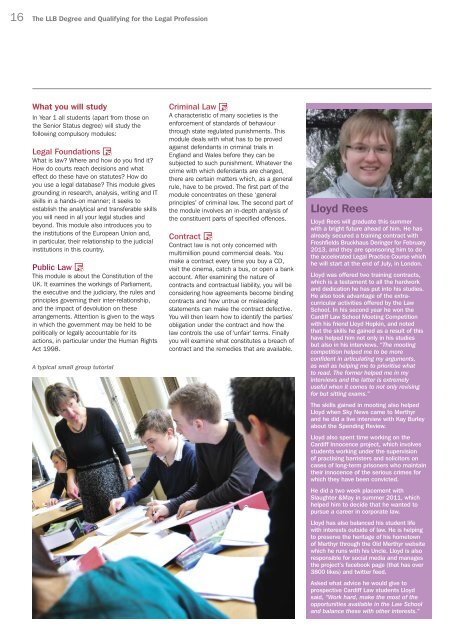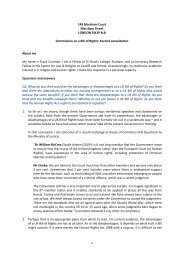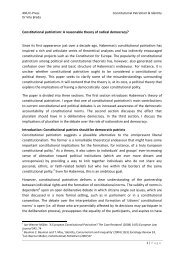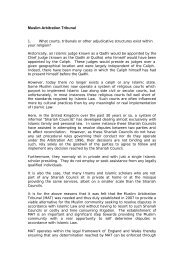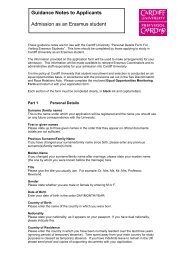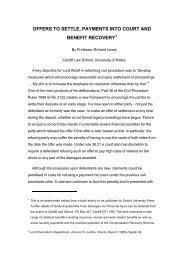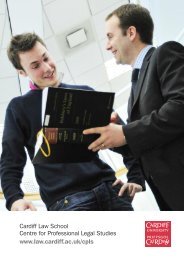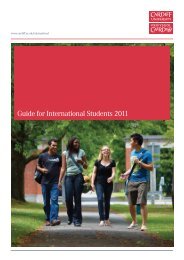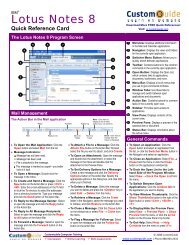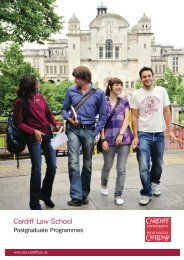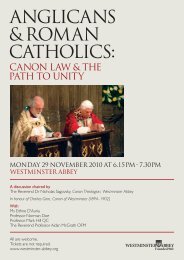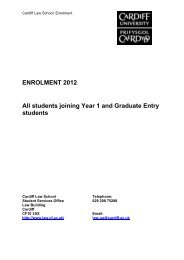Cardiff Law School - Cardiff University
Cardiff Law School - Cardiff University
Cardiff Law School - Cardiff University
You also want an ePaper? Increase the reach of your titles
YUMPU automatically turns print PDFs into web optimized ePapers that Google loves.
16 The LLB Degree and Qualifying for the Legal Profession<br />
What you will study<br />
In Year 1 all students (apart from those on<br />
the Senior Status degree) will study the<br />
following compulsory modules:<br />
Legal Foundations<br />
What is law? Where and how do you find it?<br />
How do courts reach decisions and what<br />
effect do these have on statutes? How do<br />
you use a legal database? This module gives<br />
grounding in research, analysis, writing and IT<br />
skills in a hands-on manner; it seeks to<br />
establish the analytical and transferable skills<br />
you will need in all your legal studies and<br />
beyond. This module also introduces you to<br />
the institutions of the European Union and,<br />
in particular, their relationship to the judicial<br />
institutions in this country.<br />
Public <strong>Law</strong><br />
s<br />
This module is about the Constitution of the<br />
UK. It examines the workings of Parliament,<br />
the executive and the judiciary, the rules and<br />
principles governing their inter-relationship,<br />
and the impact of devolution on these<br />
arrangements. Attention is given to the ways<br />
in which the government may be held to be<br />
politically or legally accountable for its<br />
actions, in particular under the Human Rights<br />
Act 1998.<br />
s<br />
A typical small group tutorial<br />
Criminal <strong>Law</strong><br />
A characteristic of many societies is the<br />
enforcement of standards of behaviour<br />
through state regulated punishments. This<br />
module deals with what has to be proved<br />
against defendants in criminal trials in<br />
England and Wales before they can be<br />
subjected to such punishment. Whatever the<br />
crime with which defendants are charged,<br />
there are certain matters which, as a general<br />
rule, have to be proved. The first part of the<br />
module concentrates on these ‘general<br />
principles’ of criminal law. The second part of<br />
the module involves an in-depth analysis of<br />
the constituent parts of specified offences.<br />
Contract<br />
s<br />
s<br />
Contract law is not only concerned with<br />
multimillion pound commercial deals. You<br />
make a contract every time you buy a CD,<br />
visit the cinema, catch a bus, or open a bank<br />
account. After examining the nature of<br />
contracts and contractual liability, you will be<br />
considering how agreements become binding<br />
contracts and how untrue or misleading<br />
statements can make the contract defective.<br />
You will then learn how to identify the parties’<br />
obligation under the contract and how the<br />
law controls the use of 'unfair' terms. Finally<br />
you will examine what constitutes a breach of<br />
contract and the remedies that are available.<br />
Lloyd Rees<br />
Lloyd Rees will graduate this summer<br />
with a bright future ahead of him. He has<br />
already secured a training contract with<br />
Freshfields Bruckhaus Deringer for February<br />
2013, and they are sponsoring him to do<br />
the accelerated Legal Practice Course which<br />
he will start at the end of July, in London.<br />
Lloyd was offered two training contracts,<br />
which is a testament to all the hardwork<br />
and dedication he has put into his studies.<br />
He also took advantage of the extracurricular<br />
activities offered by the <strong>Law</strong><br />
<strong>School</strong>. In his second year he won the<br />
<strong>Cardiff</strong> <strong>Law</strong> <strong>School</strong> Mooting Competition<br />
with his friend Lloyd Hopkin, and noted<br />
that the skills he gained as a result of this<br />
have helped him not only in his studies<br />
but also in his interviews. “The mooting<br />
competition helped me to be more<br />
confident in articulating my arguments,<br />
as well as helping me to prioritise what<br />
to read. The former helped me in my<br />
interviews and the latter is extremely<br />
useful when it comes to not only revising<br />
for but sitting exams.”<br />
The skills gained in mooting also helped<br />
Lloyd when Sky News came to Merthyr<br />
and he did a live interview with Kay Burley<br />
about the Spending Review.<br />
Lloyd also spent time working on the<br />
<strong>Cardiff</strong> Innocence project, which involves<br />
students working under the supervision<br />
of practising barristers and solicitors on<br />
cases of long-term prisoners who maintain<br />
their innocence of the serious crimes for<br />
which they have been convicted.<br />
He did a two week placement with<br />
Slaughter &May in summer 2011, which<br />
helped him to decide that he wanted to<br />
pursue a career in corporate law.<br />
Lloyd has also balanced his student life<br />
with interests outside of law. He is helping<br />
to preserve the heritage of his hometown<br />
of Merthyr through the Old Merthyr website<br />
which he runs with his Uncle. Lloyd is also<br />
responsible for social media and manages<br />
the project’s facebook page (that has over<br />
3800 likes) and twitter feed.<br />
Asked what advice he would give to<br />
prospective <strong>Cardiff</strong> <strong>Law</strong> students Lloyd<br />
said, “Work hard, make the most of the<br />
opportunities available in the <strong>Law</strong> <strong>School</strong><br />
and balance these with other interests.”


